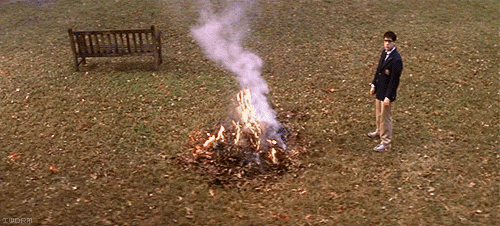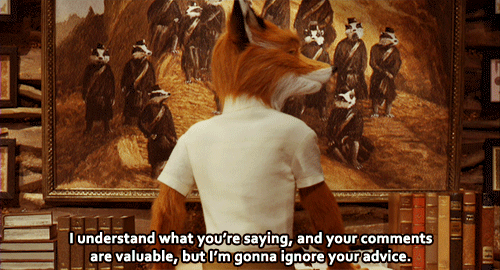Blog
How to Act Lebanese: A Brief Overview
If you’re not from Lebanon, there are certain norms of social interaction that you might find confusing and surprising to the point where you don’t know how to act. As far as I’m concerned, many of the common displays of courtesy – often masked in coy exchanges and overly kind, exaggerated gestures – border on the mildly pathological.

Also, I’m pretty sure being an introvert is banned in Lebanon because whatever you do, you must always acknowledge the presence of people you know when you see them. For more, here’s a brief look at some forced rituals of social interaction, AKA: how to act Lebanese, as illustrated in part by gifs from popular Wes Anderson films. (All in good fun, peeps. All in good fun.)
1. The Complexities of Kissing

If you have major issues with people violating your personal space, then you really shouldn’t be in Lebanon. Unless you’re dealing solely with members of the opposite sex and/or super conservative families, encroaching on other people’s personal space is just another way of properly greeting them. No really, it is an unspoken maxim of respectable etiquette that you should invade the personal-space bubble of other individuals with whom you’re interacting.
So when greeting someone, it almost always involve a kiss. How many kisses it will turn out to be is a complex enigma of idiosyncrasies wrapped in a web of confusion and maple-syrup flavored bacon, and which I’m not at all prepared to generalize. So let’s just say this: it ranges anywhere from two to four kisses and sometimes even several kisses on one cheek. I’ve also seen young children, upon greeting their grandparents, kiss their hand and put it up to their forehead three times.
My friend Eric from ViralJuice actually sums up this whole thing pretty well in in this video. tl;dr: pucker up and put on some lip balm, because if you’re in Lebanon you’re going to kiss someone.
2. Saying “No” Without Saying Anything at All

Now this is one of my favorite Lebanese mannerisms because it allows you to decline whatever it is you don’t want or like or need without uttering a single word. To perform this gesture, simply nod your head up and down (in the West this could easily be confused with the head movement for indicating “yes” to something) and roll your eyes up toward your head. Often times, this very subtle, and yet powerfully meaningful gesture, is accompanied by a sound which is impossible to truly grasp in phonetic type. Really the only way to properly demonstrate this is with a video. Behold the “tsu”:
3. When “No” Actually Means “Yes”

Upon first meeting someone, if they offer you food, sweets, a drink or some other token of generosity, you must always, always, politely decline. And as a general rule, you should decline at least three times before accepting anything. It’s all part of this customary, passive and ever-so-slightly-aggressive routine I’m convinced was created out of a desire to make Lebanon a more awkward place to live. It is truly an elusive quality of social interaction that I have to this day never quite fully been able to grasp.
So every day, be prepared to perform an inane ritual that usually involves saying “no, merci,” when what you really mean is, “Yes but at the risk of seeming even the slightest bit impolite, ask me about five more times so that I can eventually give in to your request without feeling guilty about it.”
Pro-tip: Once you do finally accept that box of sweets, don’t insult your host by only taking once piece. Eat the whole goddamn thing.


Also, I’m pretty sure being an introvert is banned in Lebanon because whatever you do, you must always acknowledge the presence of people you know when you see them. For more, here’s a brief look at some forced rituals of social interaction, AKA: how to act Lebanese, as illustrated in part by gifs from popular Wes Anderson films. (All in good fun, peeps. All in good fun.)
1. The Complexities of Kissing

If you have major issues with people violating your personal space, then you really shouldn’t be in Lebanon. Unless you’re dealing solely with members of the opposite sex and/or super conservative families, encroaching on other people’s personal space is just another way of properly greeting them. No really, it is an unspoken maxim of respectable etiquette that you should invade the personal-space bubble of other individuals with whom you’re interacting.
So when greeting someone, it almost always involve a kiss. How many kisses it will turn out to be is a complex enigma of idiosyncrasies wrapped in a web of confusion and maple-syrup flavored bacon, and which I’m not at all prepared to generalize. So let’s just say this: it ranges anywhere from two to four kisses and sometimes even several kisses on one cheek. I’ve also seen young children, upon greeting their grandparents, kiss their hand and put it up to their forehead three times.
My friend Eric from ViralJuice actually sums up this whole thing pretty well in in this video. tl;dr: pucker up and put on some lip balm, because if you’re in Lebanon you’re going to kiss someone.
2. Saying “No” Without Saying Anything at All

Now this is one of my favorite Lebanese mannerisms because it allows you to decline whatever it is you don’t want or like or need without uttering a single word. To perform this gesture, simply nod your head up and down (in the West this could easily be confused with the head movement for indicating “yes” to something) and roll your eyes up toward your head. Often times, this very subtle, and yet powerfully meaningful gesture, is accompanied by a sound which is impossible to truly grasp in phonetic type. Really the only way to properly demonstrate this is with a video. Behold the “tsu”:
3. When “No” Actually Means “Yes”

Upon first meeting someone, if they offer you food, sweets, a drink or some other token of generosity, you must always, always, politely decline. And as a general rule, you should decline at least three times before accepting anything. It’s all part of this customary, passive and ever-so-slightly-aggressive routine I’m convinced was created out of a desire to make Lebanon a more awkward place to live. It is truly an elusive quality of social interaction that I have to this day never quite fully been able to grasp.
So every day, be prepared to perform an inane ritual that usually involves saying “no, merci,” when what you really mean is, “Yes but at the risk of seeming even the slightest bit impolite, ask me about five more times so that I can eventually give in to your request without feeling guilty about it.”
Pro-tip: Once you do finally accept that box of sweets, don’t insult your host by only taking once piece. Eat the whole goddamn thing.






